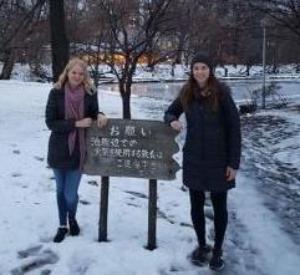
You never know where your research will take you.
For Kathleen Rankin and Charlotte Schwarz it was Sapporo, Japan.
The pair recently made a trip to Hokkaido University to participate in a student-centered international seminar on the Arctic in Asia.
Rankin, of Kingston, ON, presented her paper “Resolutions through Research: Negotiating Canadian-Danish Sovereignty Claims to the North” which analyzed the dispute between the two countries’ over the ownership of Hans Island.
“Hans Island lies in both nation states’ territorial waters in the Arctic, prompting both states to attempt to claim sovereignty over it,” Rankin said.
“The appeal lies in the natural resources that are underneath and around it, and I’ve concluded neither state wants to lose grip on maritime territory that could be paramount to economic advancement.”
A STU graduate of 2017, Rankin returned to the university this year to complete an honours degree in International Relations. She said her time at the university allowed her to pursue subjects that matter to her and develop skills that will benefit her as she moves on to graduate school.
“Through my time at STU, I’ve had the opportunity to work closely with my professors to pursue specialties that interest me,” she said. “The small class sizes helped me develop presentation skills and prepared me to present on a global scale.”
Schwarz, of Fredericton, NB, agreed.
“I’ve been given the opportunity to take courses I love and become engaged in topics that are of interest to me. The variety of courses I have had the chance to take at STU has allowed me to learn about many different aspects of political science. Then having the chance to take many small seminar classes in my upper years gave me an opportunity to get used to presenting material in front of a class.”
A double-honors student in Political Science and Great Books, Schwarz presented her paper “Canada’s Arctic policy and its relations with Russia: Must ideology be set aside for the sake of cooperation?” at the conference.
“As Arctic sea ice melts, new opportunities for oil extraction and shipping roots have arisen. This has led to an increased state interest in gaining legal sovereignty over water and ice in the Arctic,” she said.
“The Harper government allowed other political disputes with Russia, such as Russia’s annexation of the Crimea and its position on the war in Syria to leak into Arctic relations. My paper looks into future relations between Canada and Russia and whether or not the two countries can set their ideological concerns aside for the sake of cooperation.”
Following her studies at STU, Schwarz intends to complete a masters and a PhD in Political Science with the hope of helping others through research or teaching.
Rankin is planning to complete a masters in International Affairs and to work for a non-governmental organization focused on conflict resolution.
Norwegian Center for International Cooperation in Education
Support for the trip was provided by the Norwegian Center for International Cooperation in Education and was part of a research/educational project shared between The Barents Institute at the University of Tromsoe the Arctic University of Norway, St. Thomas University, Hokkaido University in Japan, and the University of the Philippines in the Philippines. The project is entitled "The Arctic in Asia, Asia in the Arctic".
-(2).jpg)